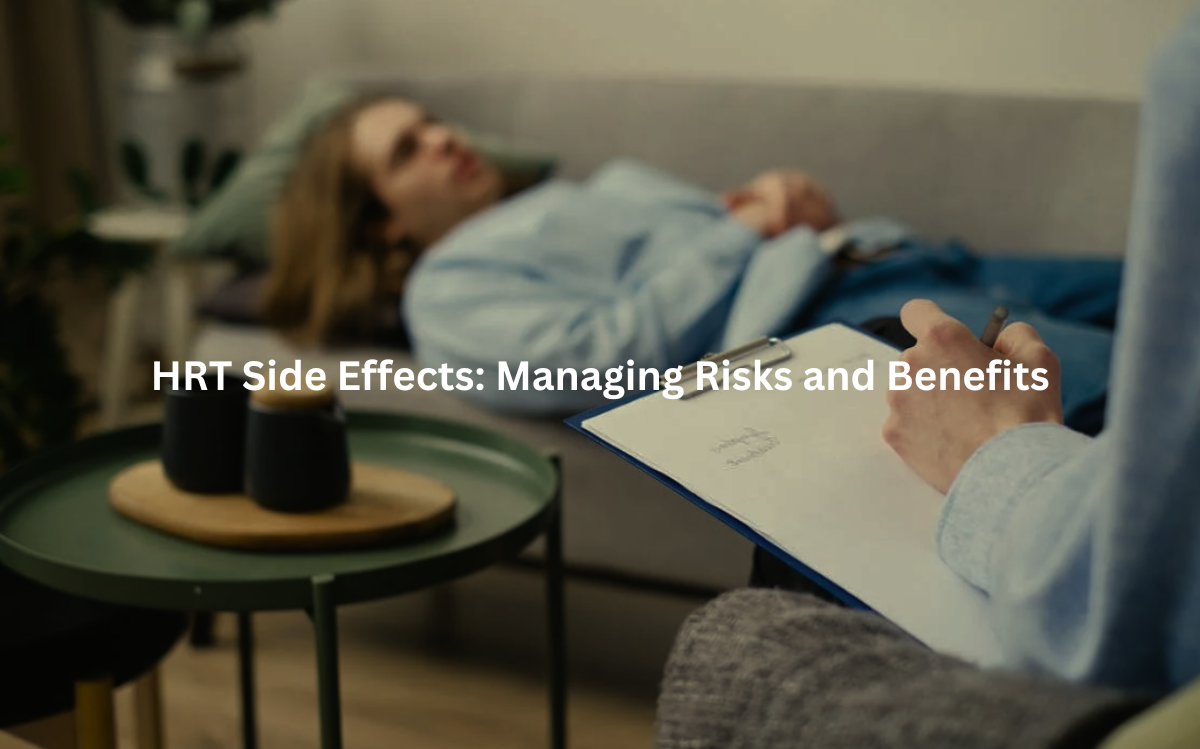Learn how to navigate the risks and rewards of HRT to find what works best for you.
Hormone Replacement Therapy (HRT) offers significant relief for menopausal symptoms, but it’s not without its risks. (1)
Understanding these risks—like blood clots, cancer, and heart disease—can help you make an informed decision. This guide breaks down the benefits and challenges, empowering you to find the safest and most effective HRT option for your needs.
Key Takeaways
- Hormone Replacement Therapy (HRT) provides symptom relief but comes with certain health risks like heart disease and cancer.
- A personalized approach to HRT, based on medical history and lifestyle, is crucial for managing menopause symptoms.
- Regular follow-ups and open conversations with healthcare providers can optimize HRT benefits while minimizing risks.
Understanding Hormone Replacement Therapy (HRT)
Hormone Replacement Therapy (HRT) is widely regarded as the most effective treatment for managing menopause symptoms, including hot flashes, night sweats, and mood swings. While many women find HRT helpful, it’s essential to know that it’s not without its risks.
The decision to use HRT should be made after considering your overall health, family history, and the potential benefits versus risks.
The Risks of HRT: What You Should Know
While HRT can provide tremendous relief, it’s important to be aware of the potential risks. These include:
- Increased risk of blood clots: This risk is higher with oral HRT, particularly for women with other risk factors like high blood pressure or obesity. Transdermal (patch or gel) HRT, however, may reduce this risk.
- Higher risk of certain cancers: Women using combined HRT (estrogen and progestogen) for extended periods may face a slightly elevated risk of breast cancer. Prolonged estrogen use without progestogen can also increase the risk of endometrial cancer, though adding progestogen reduces this risk.
- Heart disease and stroke: In women over 60, or those with existing cardiovascular risk factors, oral HRT might increase the chances of heart disease and stroke. However, the benefits might outweigh these risks if HRT is started before the age of 60 or within ten years of menopause.
It’s critical to have open discussions with your doctor to assess whether the potential risks are manageable in your case.
Benefits of HRT: Why It’s Worth Considering
While the risks are real, HRT can offer substantial benefits for many women experiencing menopause. These include:
- Relief from menopausal symptoms: The most common and well-known benefit of HRT is the alleviation of hot flashes, night sweats, and mood changes. For many women, these symptoms are not just uncomfortable—they can seriously impact quality of life. HRT provides a way to restore hormonal balance and ease these symptoms.
- Bone health: As estrogen levels decrease, the risk of osteoporosis increases. HRT helps protect against bone loss, lowering the risk of fractures later in life.
- Heart protection: In some cases, estrogen can offer cardiovascular protection, reducing the risk of heart disease. This effect is particularly evident in women who start HRT early in menopause.
HRT is not just a one-size-fits-all solution; its benefits depend on when you start treatment, your medical history, and your personal preferences.
Personalized Approach to HRT
Choosing the right form of HRT is about more than just weighing the risks and benefits. It’s about tailoring the treatment to your body’s needs. (2)
Transdermal vs. Oral HRT
For women at risk of blood clots or heart disease, transdermal HRT (delivered through a patch or gel) might be a better option than oral forms. Transdermal delivery avoids the liver and bloodstream issues associated with oral HRT, making it safer for some women.
Estrogen-Only vs. Combined HRT
Women who have had a hysterectomy can opt for estrogen-only therapy, while those with a uterus require combined HRT (estrogen and progestogen) to protect the endometrium (lining of the uterus) from excessive stimulation, which could increase cancer risk.
The Role of Lifestyle Factors in HRT Effectiveness
It’s important to note that HRT doesn’t work in isolation. Your lifestyle plays a critical role in how effective it will be.
- Exercise: Physical activity, especially strength training and aerobic exercise, can help manage menopause symptoms, improve mood, and boost overall health.
- Diet: A healthy diet rich in fruits, vegetables, and lean protein supports your body’s needs during menopause. Limiting caffeine, alcohol, and processed foods can also help manage symptoms like hot flashes.
- Stress Management: Menopause can heighten stress and anxiety, making it essential to find ways to unwind. Mindfulness, yoga, and meditation can be beneficial for emotional health.
Alternative Therapies: Exploring Your Options

If HRT isn’t an option for you or if you prefer alternatives, there are other treatments worth exploring:
- Cognitive Behavioral Therapy (CBT): This non-hormonal option can help manage mood swings, anxiety, and depression related to menopause.
- Complementary Therapies: Acupuncture, herbal supplements, and relaxation techniques may help alleviate some symptoms, though more research is needed on their effectiveness.
- Non-Hormonal Medications: Some medications, like SSRIs (antidepressants), gabapentin (a nerve medication), and clonidine (used for high blood pressure), can help with symptoms like hot flashes and sleep disturbances.
While these alternatives aren’t as effective as HRT for many women, they can be worth considering, especially if you’re unable or unwilling to use HRT.
Monitoring and Adjusting HRT
Once you start HRT, it’s essential to regularly review your treatment plan with your healthcare provider. Over time, your body may change, and the HRT dosage or type you initially chose may no longer be the best fit.
- Regular follow-ups: After the first three months of HRT, it’s important to schedule an appointment with your doctor to evaluate how the treatment is working.
- Health monitoring: Your doctor may suggest regular screenings, such as mammograms or blood pressure checks, to monitor any potential side effects of HRT.
Should You Consider HRT?
HRT isn’t for everyone, but it might be worth considering if:
- You have moderate to severe symptoms of menopause that significantly affect your quality of life.
- You’re under 60 or within ten years of menopause and have no contraindications (like a history of certain cancers or cardiovascular disease).
- You’re interested in long-term health benefits, such as improved bone health and reduced heart disease risk.
HRT can be an empowering tool for women managing menopause, but it’s essential to understand both the risks and the rewards. Regular consultations with a healthcare provider, personalized treatment plans, and adjustments as needed are key to maximizing the benefits of HRT.
Final Thoughts
Hormone Replacement Therapy can make a world of difference for many women navigating menopause, but it’s a personal journey. The risks are real, but they are manageable with the right care and consideration.
Whether you decide to pursue HRT or explore alternatives, the key is to work with your healthcare provider to make the best decision for your body. Don’t rush the process—take your time to weigh the options and choose the one that feels right for you.
Ready to take the next step? Book your consultation with Modern Menopause today and find a solution that works for you. Book now.
FAQ
What are the common side effects of HRT and how do they vary by type of HRT?
Common side effects of HRT include mood changes, breast tenderness, weight gain, and vaginal dryness. The severity and type of side effects depend on the type of HRT used, such as estrogen therapy, combination therapy with estrogen and progestin, or low-dose HRT. Serious side effects like blood clots, heart attack, and stroke are less frequent but increase with higher doses or prolonged use. It’s important to discuss risks and benefits with your doctor to find the most suitable type of HRT for your needs.
Can HRT help reduce risks like bone loss or heart disease?
Yes, HRT can help reduce the risks of bone loss and heart disease by replacing declining estrogen levels during menopause. Long-term use of HRT, particularly estrogen therapy, can protect against osteoporosis by maintaining bone density. For women at high risk of heart disease, it’s crucial to discuss with your doctor whether the benefits outweigh the risks, as HRT may slightly increase the risk of heart attacks and blood clots in certain individuals.
What should I do if I miss a dose of my HRT?
If you miss a dose of your HRT, take it as soon as you remember, unless it’s nearly time for your next dose. In that case, skip the missed dose and continue with your regular schedule. Missing doses regularly can affect the effectiveness of HRT and might lead to symptoms like hot flashes or mood changes. Always follow the instructions provided by your healthcare provider for the best results.
How can HRT impact my sex drive and weight gain?
HRT, especially estrogen and progestin combinations, can sometimes affect sex drive and weight. While some women experience a boost in libido with hormone therapy, others may face side effects like weight gain, especially with high doses of estrogen. It’s important to note that the effects of HRT on sex drive vary greatly by individual, and adjustments to the type or dosage of HRT may be necessary to find the right balance.
What are the risks of HRT in relation to cancer, such as breast or uterine cancer?
There are certain risks associated with HRT, particularly long-term use. Estrogen-only therapy increases the risk of uterine cancer, which is why it’s typically prescribed with progestin in women who have a uterus. Combined HRT can slightly increase the risk of breast cancer, especially with prolonged use.
However, for many women, the benefits of symptom relief and prevention of bone loss outweigh these risks. Discuss with your doctor to weigh the benefits and risks based on your health history.
Can a balanced diet and physical activity help with HRT side effects?
Yes, maintaining a balanced diet and regular physical activity can significantly improve the effectiveness of HRT and help manage side effects like weight gain, fluid retention, and extreme tiredness. Eating a diet rich in fruits, vegetables, and healthy fats, along with regular exercise, can also help reduce the risks of heart disease and osteoporosis, which are common concerns during menopause.
References
- https://www.healthdirect.gov.au/hormone-replacement-therapy
- https://thebms.org.uk/wp-content/uploads/2022/12/04-BMS-TfC-HRT-Guide-NOV2022-A.pdf

Leave a Reply